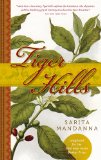Summary | Excerpt | Reviews | Beyond the Book | Readalikes | Genres & Themes | Author Bio

A Novel
by Sarita Mandanna
Here and there, scattered almost evenly between the north and the south, the local villages. A velvet patchwork of jungle soil, moist, fertile, and dark as the night sky where the forest had been hacked away. Peridotic swaths of paddy flats lining the wetlands by the streams. The sprawling, golden-thatched homes of the Coorgs, each with its designated wetlands and grazing pastures and the telltale wisps of smoke that rose from their hearths into the trees.
Finally the forest, at the base of the mountains. The thickly knitted toe of the bootie, forming a protective cover over the tip of Coorg that jutted out toward Mysore. This was dense jungle, simmering with a dangerous, compelling beauty, marked only by the faintest of trails. Only the Coorgs knew the jungle trails well, them and the charcoal-skinned Poleya tribals who served them. The trails had always been jealously guarded, especially in the old days when Coorg lay under siege. The kings of Mysore had tried for generations to bring this stubbornly independent principality under their dominion. The warfare, the abductions, the forced circumcisions, and the mass executions had served only to unite the Nayaks, patriarchs of the eight most prominent families in Coorg. They had banded together, bidding the clans under their jurisdiction to stand shoulder to shoulder against Mysore. The Coorgs resisted Mysore, digging in their heels and clinging to their land like the copper-colored crabs that burrowed in their fields.
When the British and their East India Company had finally overthrown Mysore, the Coorgs had rejoiced as one. In the peace treaty that followed, Coorg was ceded to the British. They had taken the measure of this little province, looked appraisingly at its mist-laden hills and salubrious climes so well suited to the planting of coffee. They took note of the Coorgs; tall, fierce hotheads who thought nothing of looking them in the eye and speaking as one man to another. Wisely they had been patient, pushing their agenda with polite, manicured resolve. Eventually, fifty years after they had taken Mysore, the British were formally welcomed into Coorg.
Still, despite these days of peace and the syenite roads that the British had carved, skirting the edges of the forest to connect Coorg with the neighboring provinces, collective memory ran deep. There was a band of armed and able-bodied Coorgs always stationed at the bend overlooking the entrance to the forest where the road from Mysore met the mouth of the trail. The Nayaks shared responsibility for manning this post, each staffing it with men from the clans under his dominion for five weeks at a stretch except for the three months of the monsoons, when the trails were rendered impassable by mudslides and trees felled by lightning. Today, the lookout post was quiet. Men lay snoring in the rough bamboo-and-burlap machan while Nachimanda Thimmaya kept watch. The afternoon wind picked up, gusting through the branches overhead and scattering dried leaves through the machan. Thimmaya shivered, drawing his tunic closer about him.
If only he had picked the white cowrie shell this year, curse his luck. When Pallada Nayak, the village headman, had announced the date of the cowrie picking, Thimmaya had gone especially to the Iguthappa temple, offering its all-powerful deity, Iguthappa Swami, a whole two rupees, money he could scarcely afford. He had sacrificed a fowl to the ancestors and yet another to the veera, the ghosts of long-dead valiants. Leaving nothing to chance, Thimmaya had even propitiated the wood spirits with a hefty bundle of pork and rice left in the forest. The day of the picking, when the priest had extended his closed fists toward him, Thimmaya had sent up yet another fervent prayer to Iguthappa Swami. But no, he had pointed at a fist and the priest had opened his palm only to reveal a black cowrie; Thimmaya had been selected once more, three years running, to man the post.
Excerpted from Tiger Hills © Copyright 2011 by Sarita Mandanna. Reprinted with permission by Grand Central Publishing. All rights reserved.
Censorship, like charity, should begin at home: but unlike charity, it should end there.
Click Here to find out who said this, as well as discovering other famous literary quotes!
Your guide toexceptional books
BookBrowse seeks out and recommends the best in contemporary fiction and nonfiction—books that not only engage and entertain but also deepen our understanding of ourselves and the world around us.